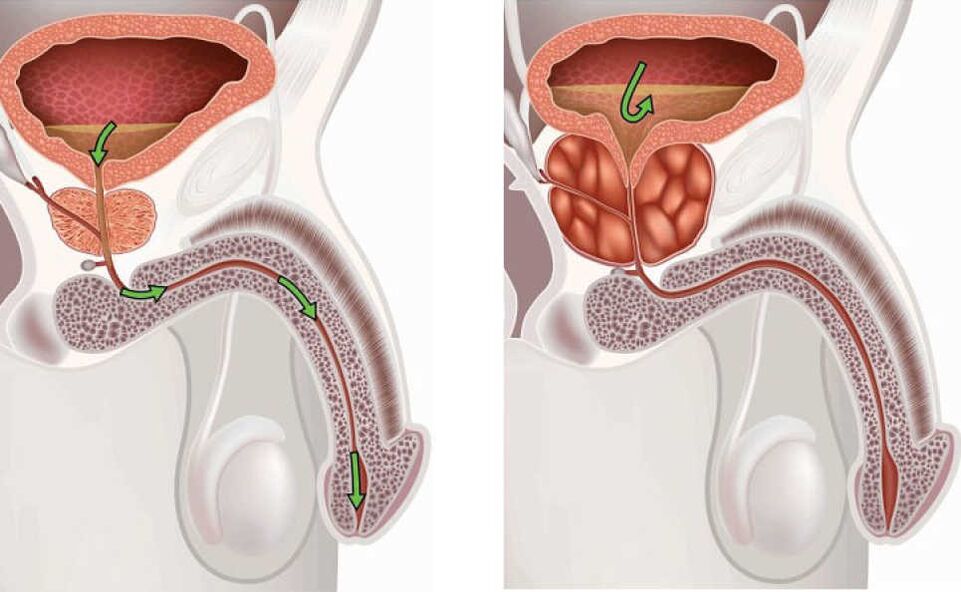
Chronic prostatitis is a complex pathology of the prostate gland that causes a violation of the structure and function of the organ. This disease is characterized by pain in the pelvic organs, urinary problems, disorders in the sexual sphere. To cope with the pathology and prevent it from relapsing, you need to see a doctor in time. In difficult situations, it cannot be done without surgery.
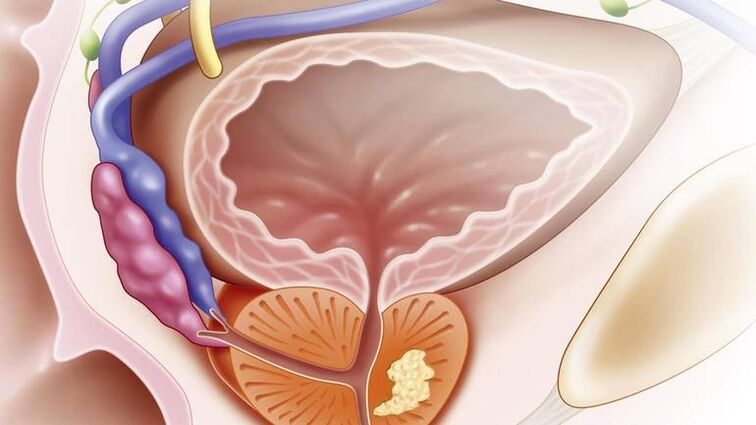
The reasons
One of the main causes of chronic prostatitis is infection with bacterial microorganisms. Pathogens can enter the organ through infected urine or into the urethra.
In the chronic form of the disease, infection acts as a provoking factor. Moreover, the disease can persist even after the bacteria have been removed. Primary inflammation of the prostate leads to disturbances in the innervation of the organ and triggers the autoimmune process. As a result, many men face abstract prostatitis in which the infection is undetectable.
It should not be forgotten that bacteria live in every person’s body, but they do not always cause prostatitis.
The appearance of a chronic form of the disease is associated with a number of factors. These are the following:
- Deterioration of the immune system due to hypothermia, lifestyle disorders and other factors.
- Congestion in the pelvic organs - circulatory disorders can lead to chronic constipation, insufficient active lifestyle.
- Lack of systematic sex.
- Chronic infections in the body - sinusitis, tonsillitis and other diseases.
- History of genital infections.
- Inflammation of the urogenital system.
- Permanent traumatic damage to the prostate gland - these can be linked to increased stress on perineum muscle tissue and other causes.
- Dietary disorders.
- Bad habits.
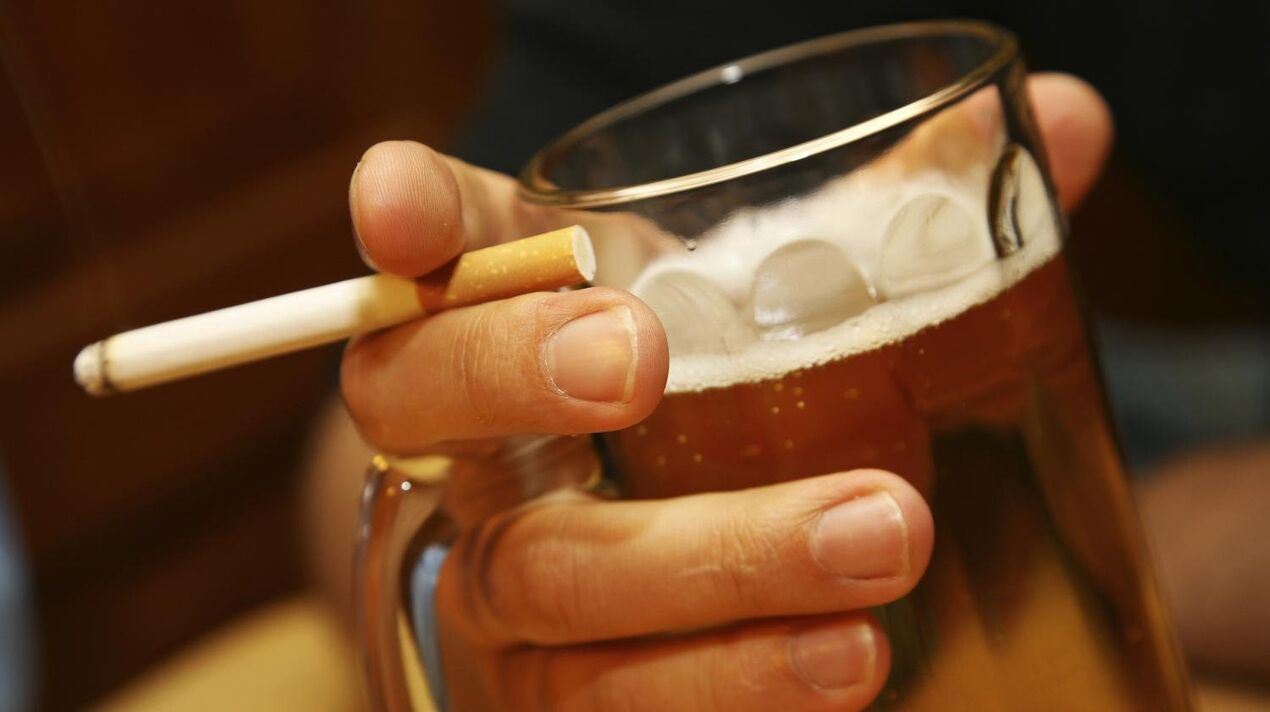
As the pathology progresses, it becomes chronic. This is due to the lack of timely therapy.
Classification
Urologists distinguish several types of prostatitis, each of which is characterized by certain characteristics:
- Infectious- the cause of the disease is bacterial microorganisms invading the prostate. In most cases, chronic prostatitis is caused by chlamydia. This type of disease often becomes the cause of reproductive disorders.
- Not contagious- the exact causes of such prostatitis cannot be determined. Often the provocative factor is disorders of the structure of the prostate that cause the bladder to compress. This causes frequent urination. In addition, autoimmune damage to organ tissue can cause problems.
- Pangó- its development leads to insufficient emptying of the prostate and accumulation of excess blood. In case of stagnation, the formation of the inflammatory process is observed.
- Asymptomatic- does not involve any manifestation and does not cause discomfort.
- Chronic pelvic pain syndrome- in this case, the inflammatory process is accompanied by constant discomfort in the perineal region.
Symptoms
To cure chronic prostatitis, you need to identify the pathology as early as possible. In the early stages of development, the disease is asymptomatic. That's why many men are in no hurry to see a doctor.
With such a diagnosis, the nervous system suffers primarily. The patient has increased irritability, apathy, sleep disturbance, fatigue, general weakness. Often, men with such a diagnosis complain of a deterioration in appetite.
In addition, the typical symptoms of chronic prostatitis are:
- Frequent urination.
- Aching pain. They are located in the rectum, perineum and lumbar region. In addition, many men experience constant discomfort in the scrotum and penis head. There is often pain syndrome in the sacral area.
- Pain when urinating. There is a particularly severe discomfort at the beginning and end of bladder emptying.
- Shaking and excessive sweating. This is due to the fact that the prostate is part of the endocrine system.
- Discoloration of the skin. This occurs locally - in the projection of the area of pain.
- Distribution of small amounts of secretions from the penis. This is due to a decrease in the tone of the prostate. If the patient’s glands are tense, they are unable to retain some of the contents.
- Sexual disorders. Chronic prostatitis causes problems with erection and ejaculation. With a decrease in testosterone synthesis, a loss of libido is observed.
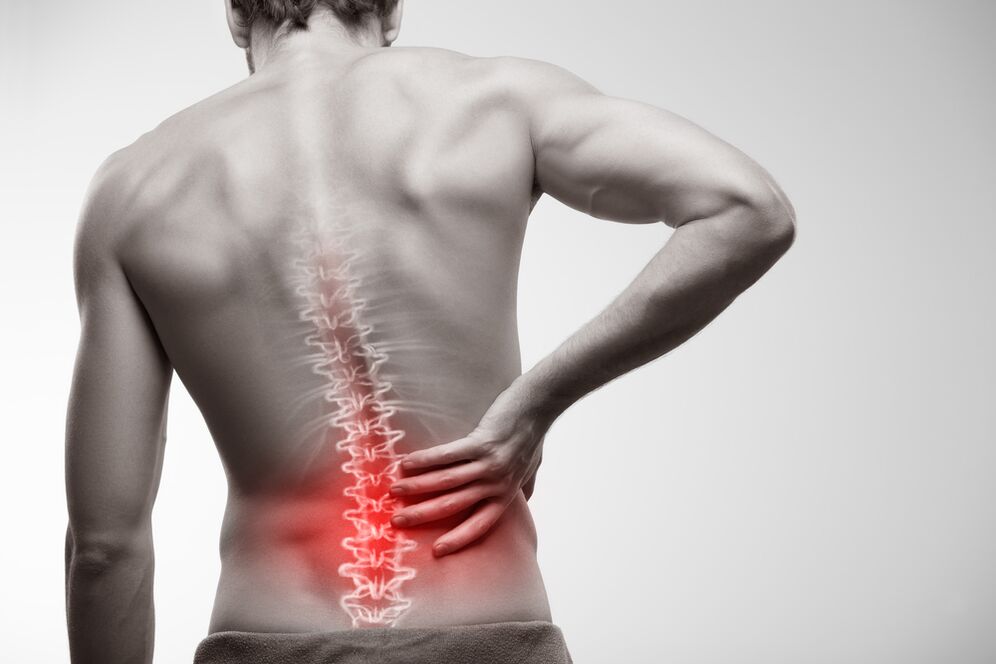
Any signs of chronic prostatitis can be seen by a doctor for medical reasons. If this is not done in time, the pathology cannot be cope.
Diagnostics
The help of a urologist is needed to identify the pathology. The specialist will perform the following procedures:
- Patient interview- helps identify pain and discomfort.
- Feeling the prostate- is performed through the anus.
- Examination of the groin- allows the detection of rashes, skin irritation, secretions.
- Collection of prostate secretions.
These manipulations cause tangible discomfort and sometimes cause pain. However, these are very important in making an accurate diagnosis.
In addition, you must pass the following tests to detect chronic prostatitis:
- bacteriological examination of urine;
- clinical analysis of urine;
- three glasses of urine sample;
- urethral smear;
- scraping - helps identify the pathogen of the disease.
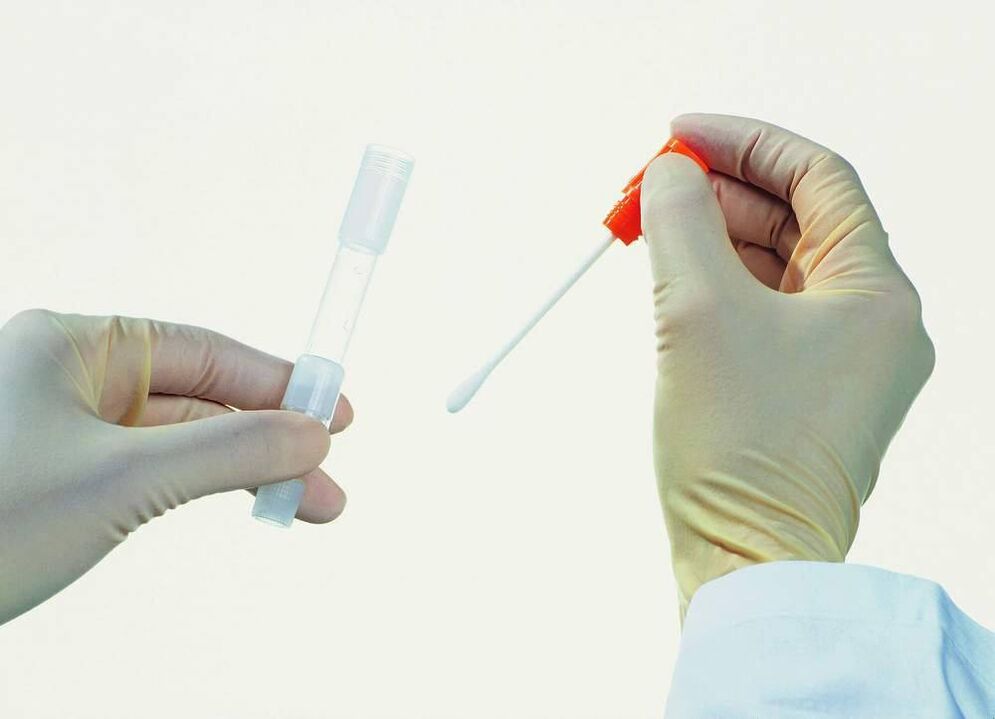
Hardware tests are mandatory elements of diagnostics:
- Prostate ultrasound - helps determine gland size, identify tumor formations or cysts;
- Uroflometry - allows you to assess the rate of urine excretion;
- CT scan;
- Biopsy.
Treatment
Complete elimination of chronic prostatitis is very problematic. This is due to the fact that many men go to the doctor too late. But with stable therapy, stable remission can be achieved.
To cope with the disease, you must choose a number of methods that affect the inflamed focus. When choosing a treatment regimen for chronic prostatitis, you should consider the following characteristics:
- the age of the patient;
- symptoms of the disease;
- the stage of inflammation;
- the state of the immune system.

If the chronic form of the disease has caused complications, your doctor may recommend surgery. However, most often, the therapy of the disease includes the following ingredients:
- taking antibiotics;
- normalization of blood flow in the pelvic organs and elimination of edema in the prostate;
- symptomatic therapy;
- use of anti-inflammatory drugs;
- use of folk recipes;
- dietary correction.
A full course of treatment contributes to achieving stable results and improving the patient’s condition. However, the effectiveness of therapy is highly dependent on the patient's mood.
Drug therapy
If the pathology is caused by bacterial microorganisms, doctors should prescribe antibacterial agents. They should be taken until the level of pathogenic bacteria returns to normal. It often takes a long time.
It should be borne in mind that the use of antibiotics in non-infectious forms of the disease is strictly prohibited. They cause severe damage to the body and cause immune deficiency.
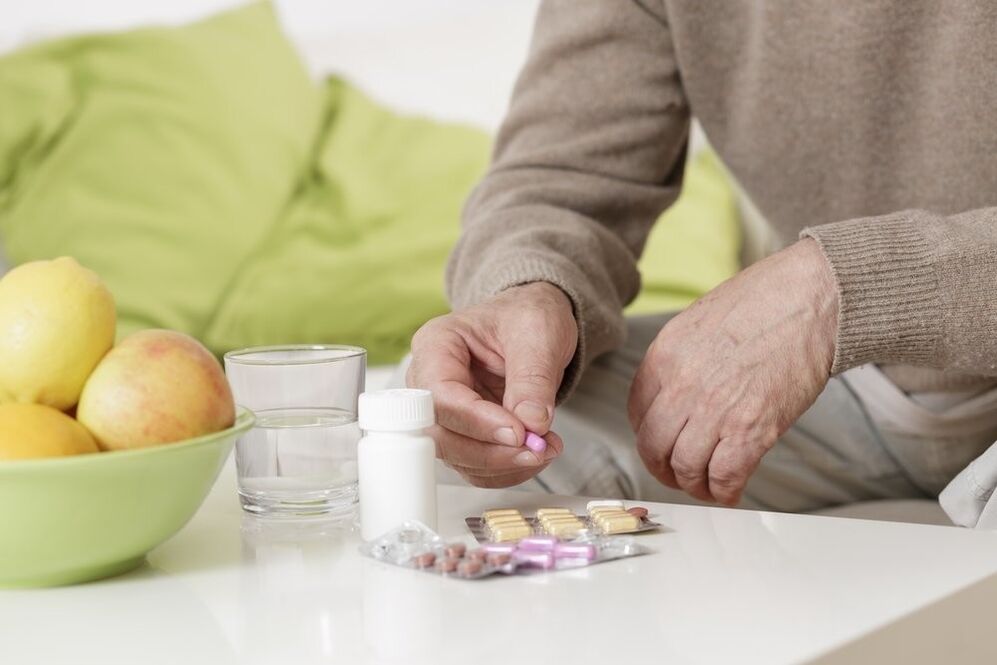
When selecting a particular drug, the physician should consider the following characteristics:
- the composition of the pathogenic microflora;
- the risk of unpleasant consequences;
- sensitivity of the body to drugs;
- duration and methods of application;
- the possibility of combining drugs and other therapeutic methods.
Symptomatic treatment of chronic prostatitis depends on the manifestations of the disease. The clinical picture may vary depending on the form of the disease.
However, inflammation of the prostate is always accompanied by urinary disorders. In these situations, patients are prescribed alpha-blockers. Such funds ensure the normalization of the urogenital organs.
Strengthening the immune system is an essential part of therapy. Immunomodulators are often used to prevent autoimmune aggression. Products containing zinc or echinacea can be used to increase the body's defenses. It is also useful to take pumpkin seeds. All of these substances successfully cope with pathogenic bacteria.
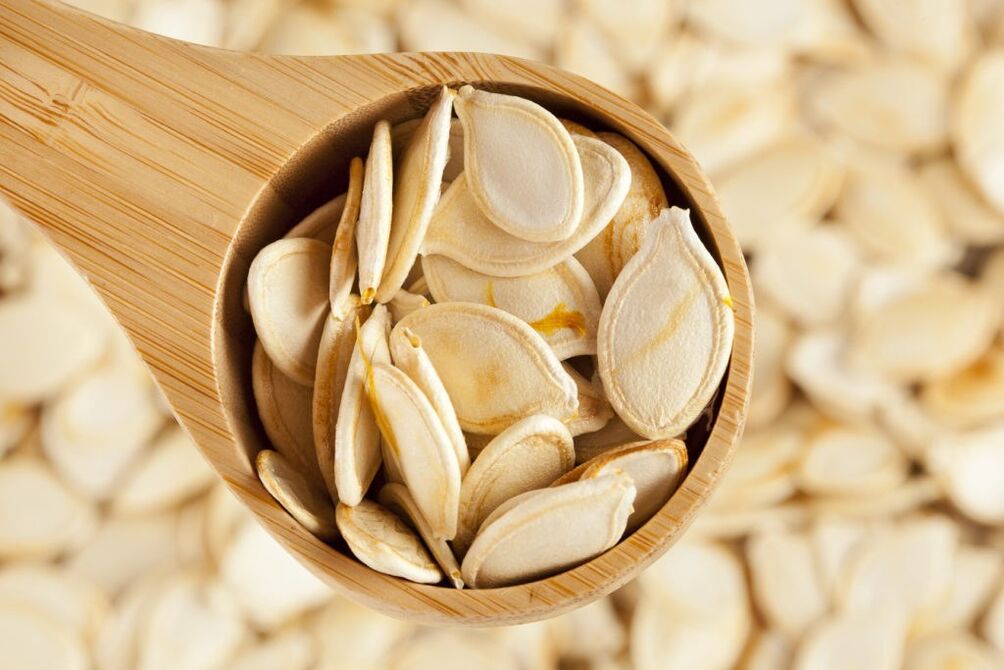
In addition to such therapy, vitamin complexes are necessarily prescribed. Such foundations initiate the process of cell regeneration and increase resistance to pathogenic bacteria.
Anti-inflammatory therapy involves the use of drugs to combat inflammation.Most commonly, rectal suppositories are prescribed that contain the following ingredients:
Morpholinium methyl triazolyl thioacetate - helps normalize tissue repair;
- Ichtammol - helps improve blood flow;
- Propolis - suppresses the inflammatory process and helps strengthen the immune system.
As the temperature parameters increase, NSAIDs can also be used. These funds are extremely effective.
Physiotherapy
Physiotherapy methods for the treatment of chronic prostatitis can rapidly improve the patient's condition and achieve stable results. There are a number of effective methods that benefit from this diagnosis. The most important are listed below.
Heat effect
Under the influence of warm water, it is possible to alleviate the inflammation of the affected tissues.Therefore, men with such a diagnosis should systematically take hot baths.Remember not to keep the water too hot.
Herbs or sea salt can be added to the water. Marigold or chamomile decoction is suitable for stopping inflammation and treating pain. Sage also has an excellent effect.
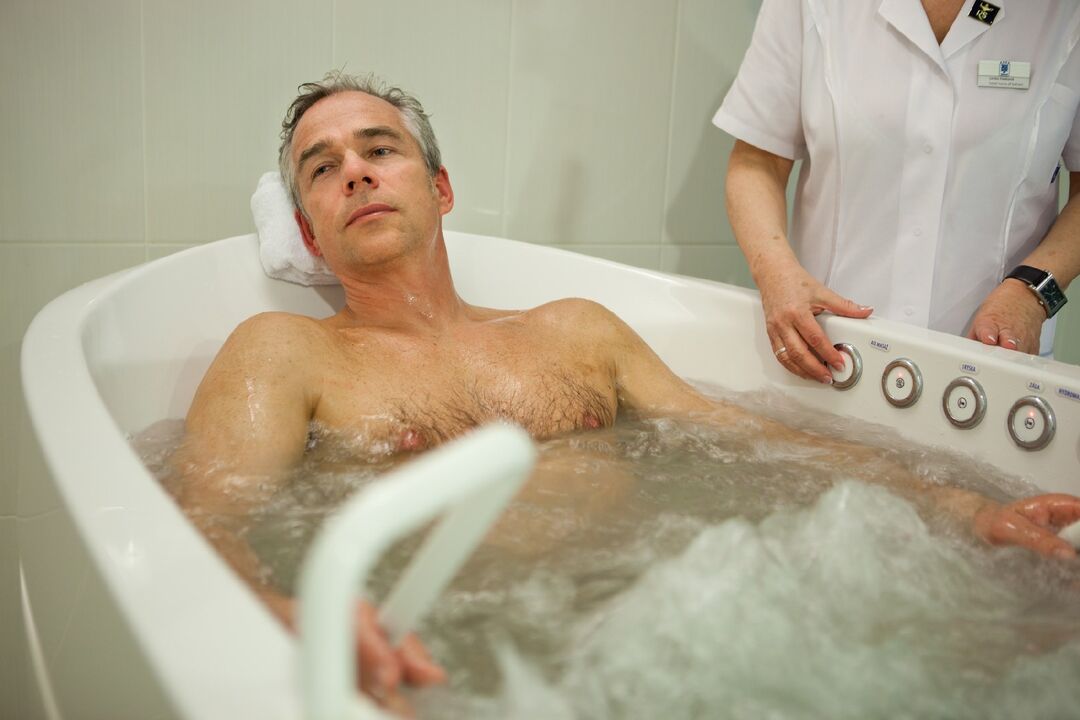
The procedure improves blood circulation, removes pus and restores metabolic processes. People with such a diagnosis should systematically take such baths.
Electrotherapy
In this case, an electrical effect is used to combat prostatitis. The most efficient method is electrophoresis. Doctors also often prescribe an inductotherm in the perineal zone. Thanks to this effect, you can cope with prostate discomfort in about 70% of cases.
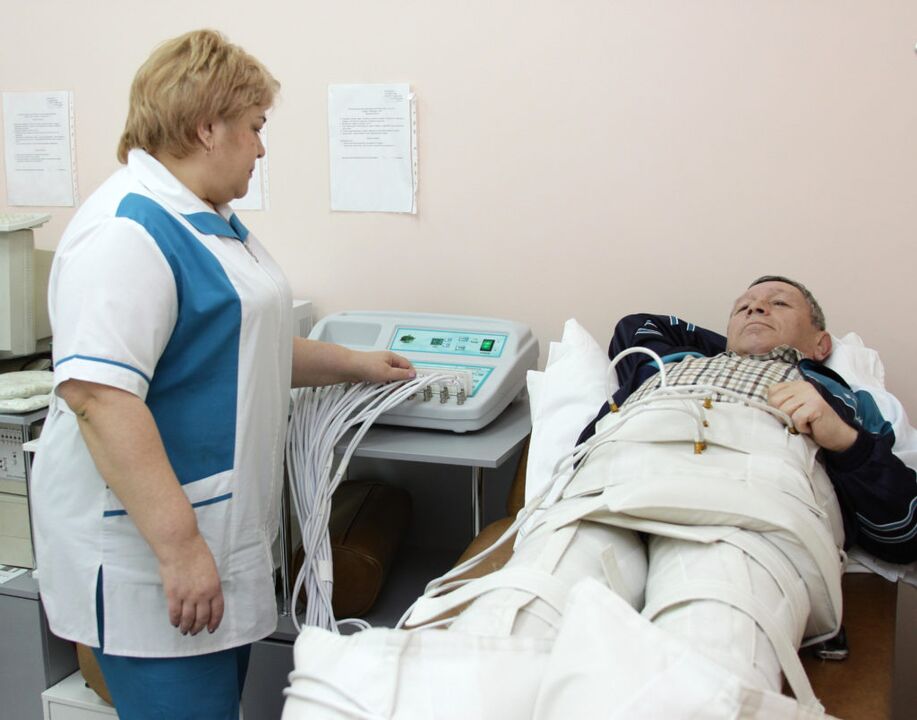
It is important to note that therapy for chronic pathology does not produce rapid results. In some situations, physiotherapy treatment can take weeks or even months. However, the result is worth it. Therefore, it is very important to strictly follow the medical recommendations and not to stop treatment prematurely.
Laser therapy
Several studies have confirmed the effectiveness of laser exposure in the fight against pathology. The technique does not require much time and does not cause pain.
This treatment is performed when the bladder is half full. This promotes the excretion of prostate secretions in the urine. During the procedure, the patient should lie on their back and relax. A laser effect occurs on the perineum through the gauze layer. This occurs through the skin or intrarectally.
Other methods
Many other techniques can help you achieve great results:
- Ultrasound exposure.You can successfully cope with prostatitis under the influence of inaudible high-frequency vibrations. They also help with prostate adenoma;
- Ultrasonophoresis.In this case, the therapeutic effect is achieved by a combination of the effect on the body of the ultrasound exposure and the drugs used in the procedure;
- Magnetotherapy.A permanent magnetic field can be used to eliminate chronic inflammation of the prostate. A low frequency field is also often used;
- Microwave therapy.In this case, a high-frequency electromagnetic field is used;
- Darsonvalization.In such a situation, high frequency and voltage pulse current is used;
- Plating.Using this technique, the therapeutic effect is achieved by low voltage and low frequency direct current;
- UHF.With this method, the capacitor plates are introduced into the damaged tissue. The therapeutic effect is achieved by the action of an electric field.
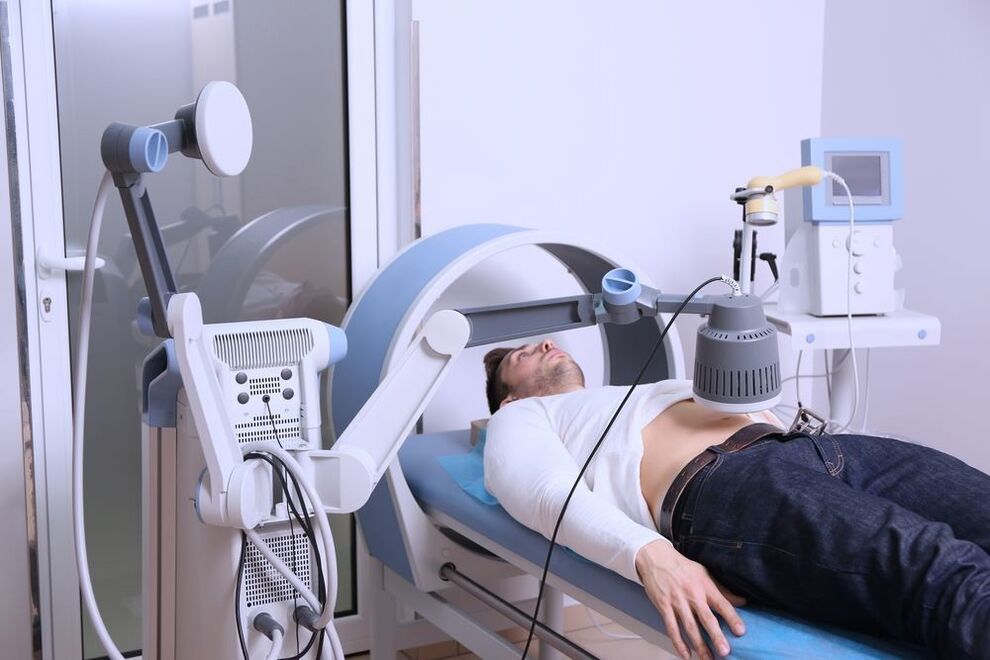
Folk recipes
You can use effective folk recipes to make traditional therapies for the disease more effective. The most effective tools are:
- Pumpkin seeds.The first manifestation of the disease should start consuming 30 seeds a day. A ball made of honey and pumpkin would be a great option. To do this, crush 500 g of raw seeds with a meat grinder and mix with 200 g of honey. Make medium hazelnut sized balls from the composition. You should eat 1-2 balls a day.
- Pumpkin flour.The seeds should be chopped in a blender. As a result, they must obtain the consistency of the powder. Eat 2 large spoons 30 minutes before meals. Drink the preparation with water. This is one of the most effective treatments for prostatitis. You must take 1 course of treatment during the year to prevent relapse.
- Poplar bark.In order to achieve the desired result, it is important to properly prepare the raw materials. The bark should be harvested in late April, before the first leaves appear. The composition must be well dried and crushed. Then take a 1-liter container and fill with a third of the crust. Fill the remaining space with water. Leave for 2 weeks, then filter thoroughly. Drink 1 large spoonful of infusion 3 times a day.
- Curly parsley.The seeds and roots of the plant are used to treat chronic prostatitis. It is also very beneficial to consume parsley juice. This should be done 30 minutes before a meal. Some people grind the seed of the plant to a powder. They should then be poured over boiling water and kept on the stove for an additional quarter of an hour.
- Garlic.To make a medicinal tincture, take 5 cloves of garlic, add 500 ml of boiling water and leave for one day. Then filter the composition and drink 50 g. This should be done every day before meals.
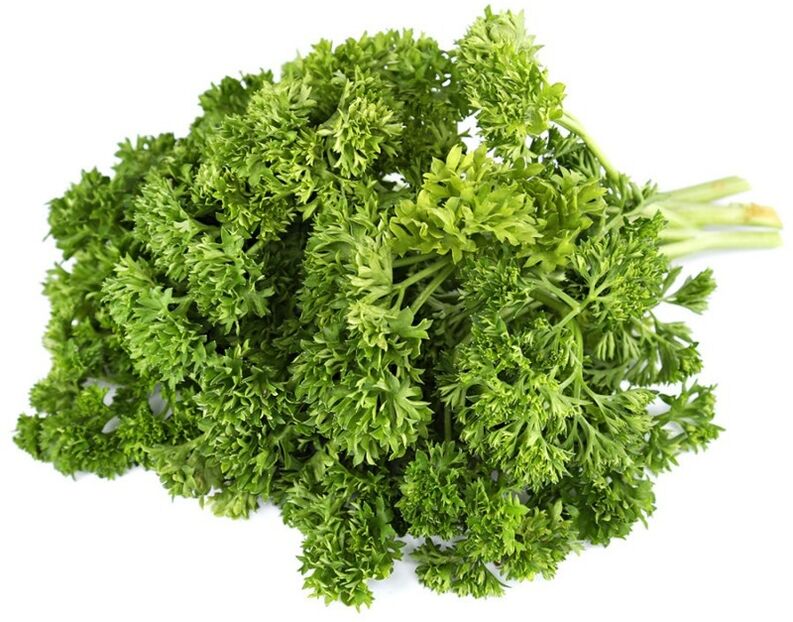
In order for folk remedies to achieve the desired result, you must follow the following recommendations:
- Follow a healthy lifestyle during therapy;
- Homemade recipes are very useful in addition to massage;
- Be sure to tune in to long therapy;
- Don't be afraid of side effects. Most of the ingredients in such products successfully cleanse the body and remove harmful substances from it.
If you experience any unpleasant symptoms during therapy, be sure to see a doctor. The course of treatment usually lasts for a month. In some situations, longer therapy may be needed. It is very important to complete the treatment.
Physiotherapy
The main cause of prostatitis is a violation of the blood flow to the pelvic organs. This becomes a provocative factor of stagnation. To improve blood flow, you need to activate with physical activity. This is the most effective way to treat congestive prostatitis. In the case of a bacterial infection, exercise is unlikely to produce tangible results.
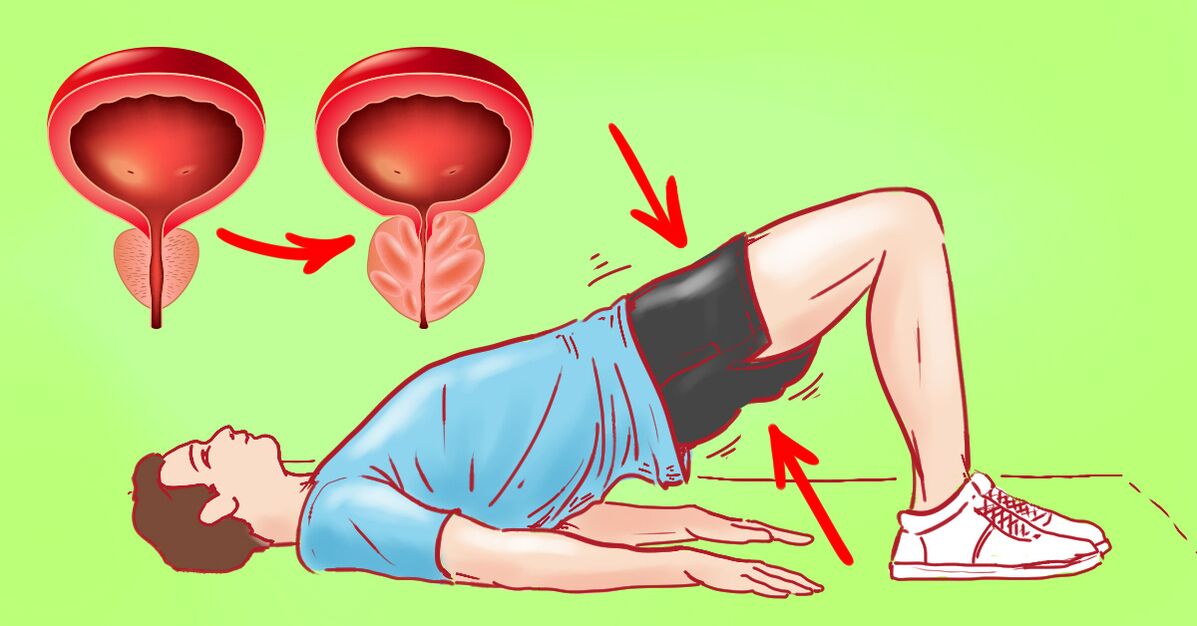
To eliminate the symptoms of chronic prostatitis, it is helpful to perform the following exercises:
- Squat.This is one of the most effective therapies. You have to squat deep - only this will give tangible results. You should perform 100 such exercises per day. If this is difficult to do right away, you can divide the movements into 3 approaches. With the onset of leg pain the next day, it is possible to judge the weakness of the muscle tissue in the leg and the unsatisfactory blood flow to the pelvic organs.
- Scissors.Each foot must make 20 such movements.
- Lifting the legs.This exercise should be done lying on your back. A maximum of 20 repetitions must be performed at a time.
Massage is an effective way to fight prostatitis. It should be done several times a day. As a result, you will be able to cope with stagnant glands.
Surgical intervention
This method of therapy is used in extreme cases where other methods do not make it possible to cope with the disease. To combat chronic prostatitis, a special device is inserted through the urethra. It is used to remove some of the affected tissue. Generally, transurethral resection of the prostate is used with this diagnosis.
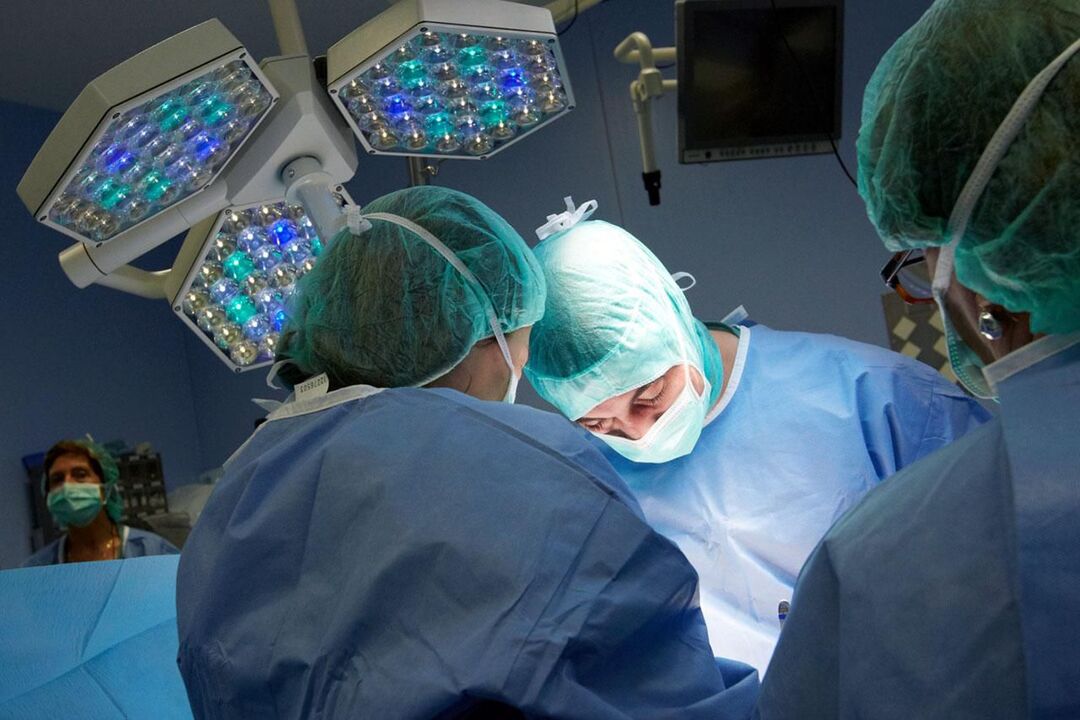
As a result, it is not just chronic prostatitis that can be tackled. This technique is actively used to combat organ adenoma. In more complex situations, it is impossible to do without an open operation. In this case, the patient will have scar defects on the skin after surgery.
Food
Proper nutrition is very important to eliminate chronic prostatitis. In case of such a diagnosis, overeating and consumption of mismatched foods should be avoided. It’s best to give up coffee, fatty meats, canned food and pickled foods.
Alcohol also has a negative effect on prostate health. If you want to avoid a permanent worsening of your disease, you should stop using alcohol altogether.
It is also important to quit smoking altogether.Nicotine has a very bad effect on all organs, of which the prostate is no exception.To cope with the pathology, you need to eat right and walk more in the fresh air.
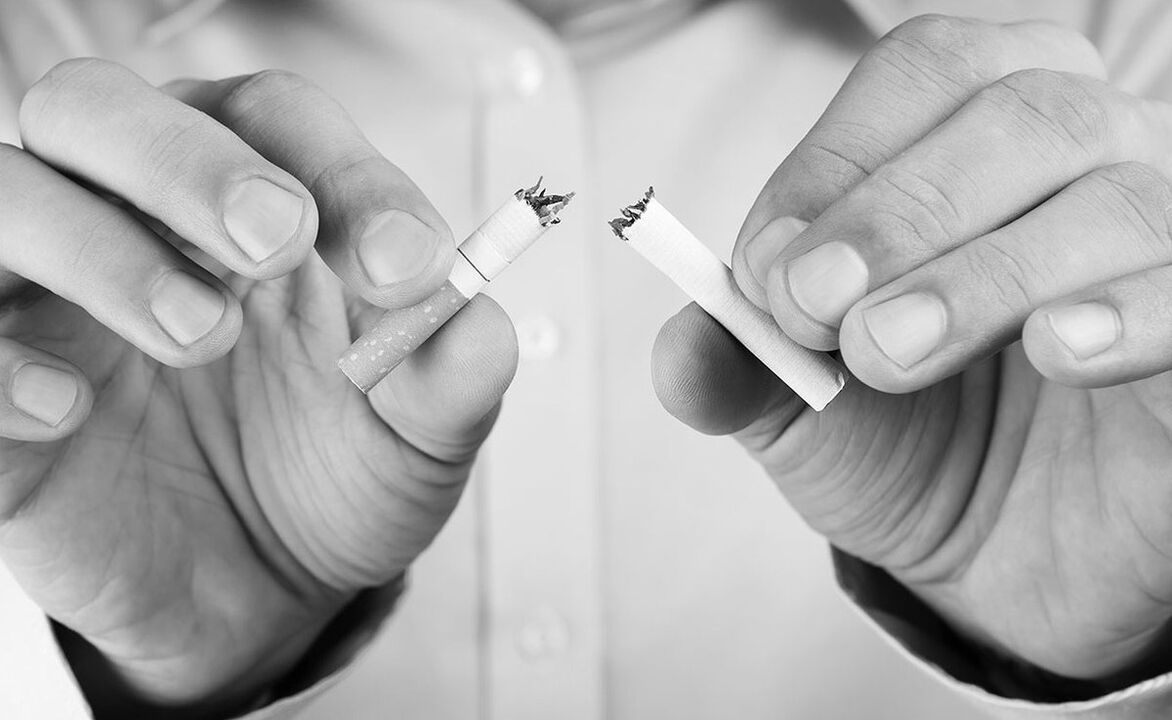
It is very important to change your diet. Instead of fatty meats and sausages, you should eat a lot of fruits and vegetables. They have excellent taste and great benefits to the body.
Such a diet reliably protects against harmful bacteria, which often cause inflammation in the genitals. After a few days of such a diet, your health will improve noticeably.
Possible complications
If you do not start therapy for pathology in time, it can cause dangerous complications. The main consequences of chronic prostatitis are:
- Erectile dysfunction.In a man, ejaculate production is reduced or completely absent. Potency is also severely impaired.
- Violation of urination.
- Cystitis.
- Acute urinary retention.
- Bladder narrowing.In this case, the man cannot urinate at all.
- Hemorrhoids.
- Oncology.Such diseases develop with the prolonged presence of chronic prostatitis.
- Disorders of the nervous system.Many people struggle with depression, excessive fatigue, and increased irritability. In addition, men often experience a state of apathy.
- Cicatricial lesions of the prostate.The inflammatory focus provokes a violation of the structure of the gland. Gradually, the tissues are replaced by scars. As a result, the work of the organ is severely interrupted. These changes are called fibrosis.
- Damage to the entire reproductive system.In advanced prostatitis, there is damage to the testicles and inflammation of the appendages. Vesiculitis often develops as a lesion of the seminal vesicles. As a result of these processes, reproductive functions are greatly reduced and infertility develops in humans.
Prevention
To avoid worsening of chronic prostatitis, you should follow these recommendations:
- Avoid hypothermia, do not sit on cold surfaces;
- Visit a urologist every year for an examination;
- Do not tolerate the urge to urinate;
- Discard alcoholic beverages as the disease worsens and do not consume much alcohol during remission;
- If you need to sit for a long time per hour, do a warm-up - it should last at least 5 minutes;
- Have an active sex life, avoid long breaks;
- Use a prostate stimulator;
- Avoid damage to the perineum;
- Fight constipation.

Chronic prostatitis is a rather complex pathology that negatively affects a person’s sexual activity and severely impairs their quality of life. To deal with this violation, you need to see a doctor in a timely manner and strictly follow all of his recommendations. Only in this case can noticeable results be achieved.
Recommendations
Numerous reviews of the treatment of chronic prostatitis indicate that this disease can and should be combated.
- "When the symptoms of prostatitis appeared, I didn’t go to the doctor right away. Everyone was hesitant to say about his delicate problem. As a result, I had very serious problems that had to be solved for a long time. After about six months of complex therapy, I underwent a second study. I am very glad that there is no sign of prostatitis. "
- "Prostatitis is a very unpleasant problem. It all started with severe hypothermia, lower back and prostate pain, urinary discomfort. I lasted a long time. When I went to the doctor, I was already diagnosed with chronic prostatitis. It cannot be completely cured. Therefore, the therapy was aimed at achieving stable remission. I want to tell every man not to delay a visit to the urologist. "
- "My husband was diagnosed with chronic prostatitis a year ago. It is a very serious health condition that affects quality of life and sexual activity. The treatment lasted a long time. After about a few months of therapy, the situation improved significantly. However, the disease has not been completely cured ".



























